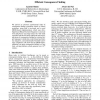Free Online Productivity Tools
i2Speak
i2Symbol
i2OCR
iTex2Img
iWeb2Print
iWeb2Shot
i2Type
iPdf2Split
iPdf2Merge
i2Bopomofo
i2Arabic
i2Style
i2Image
i2PDF
iLatex2Rtf
Sci2ools
103
click to vote
IJCAI
2001
2001
Efficient Consequence Finding
We present an extensive experimental study of consequence-finding algorithms based on kernel resolution, using both a trie-based and a novel ZBDD-based implementation, which uses ZeroSuppressed Binary Decision Diagrams to concisely store and process very large clause sets. Our study considers both the full prime implicate task and applications of consequence-finding for restricted target languages in abduction, model-based and faulttree diagnosis, and polynomially-bounded knowledge compilation. We show that the ZBDD implementation can push consequence-finding to a new limit, solving problems which generate over 1070 clauses.
Related Content
| Added | 31 Oct 2010 |
| Updated | 31 Oct 2010 |
| Type | Conference |
| Year | 2001 |
| Where | IJCAI |
| Authors | Laurent Simon, Alvaro del Val |
Comments (0)

